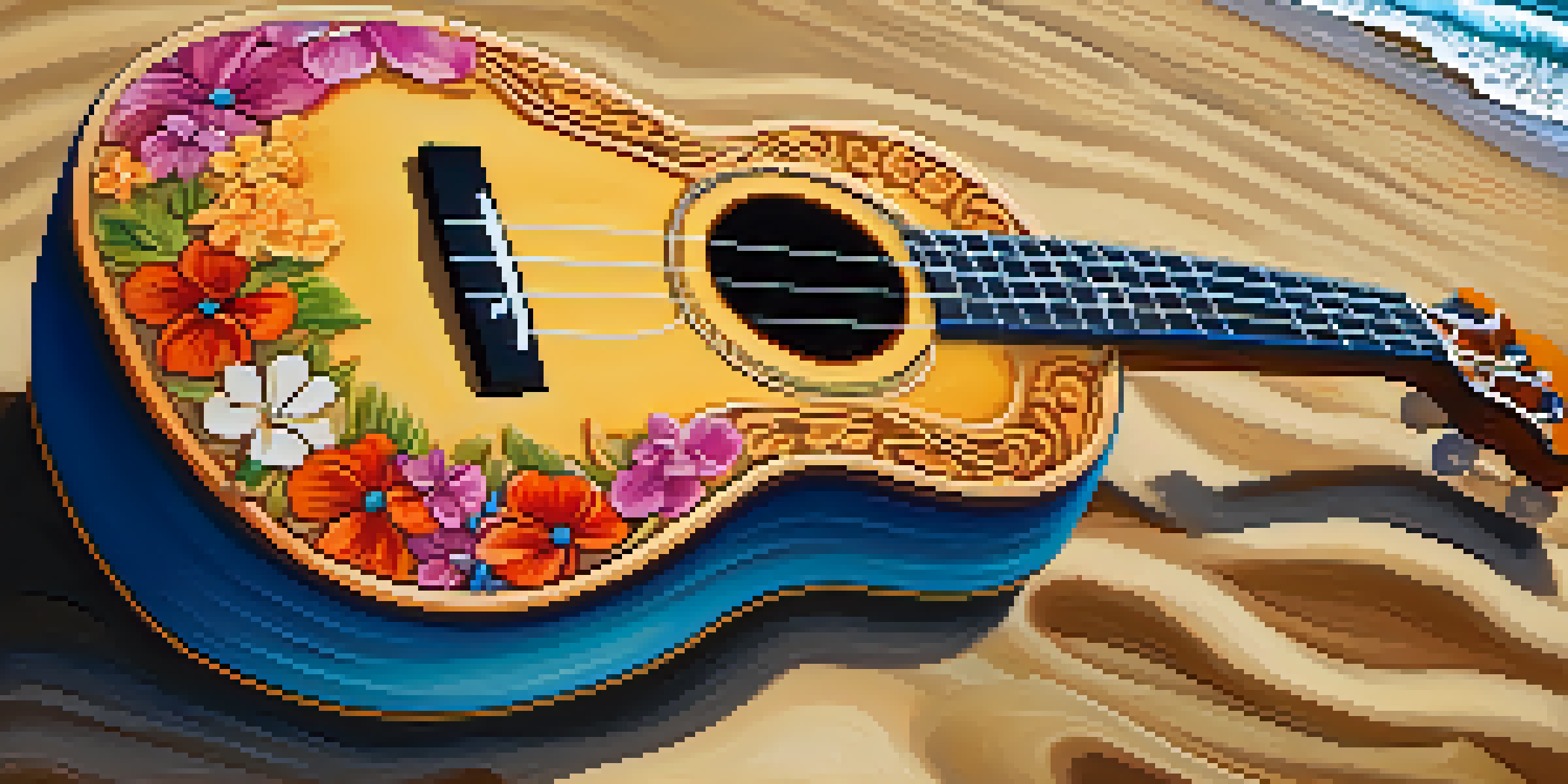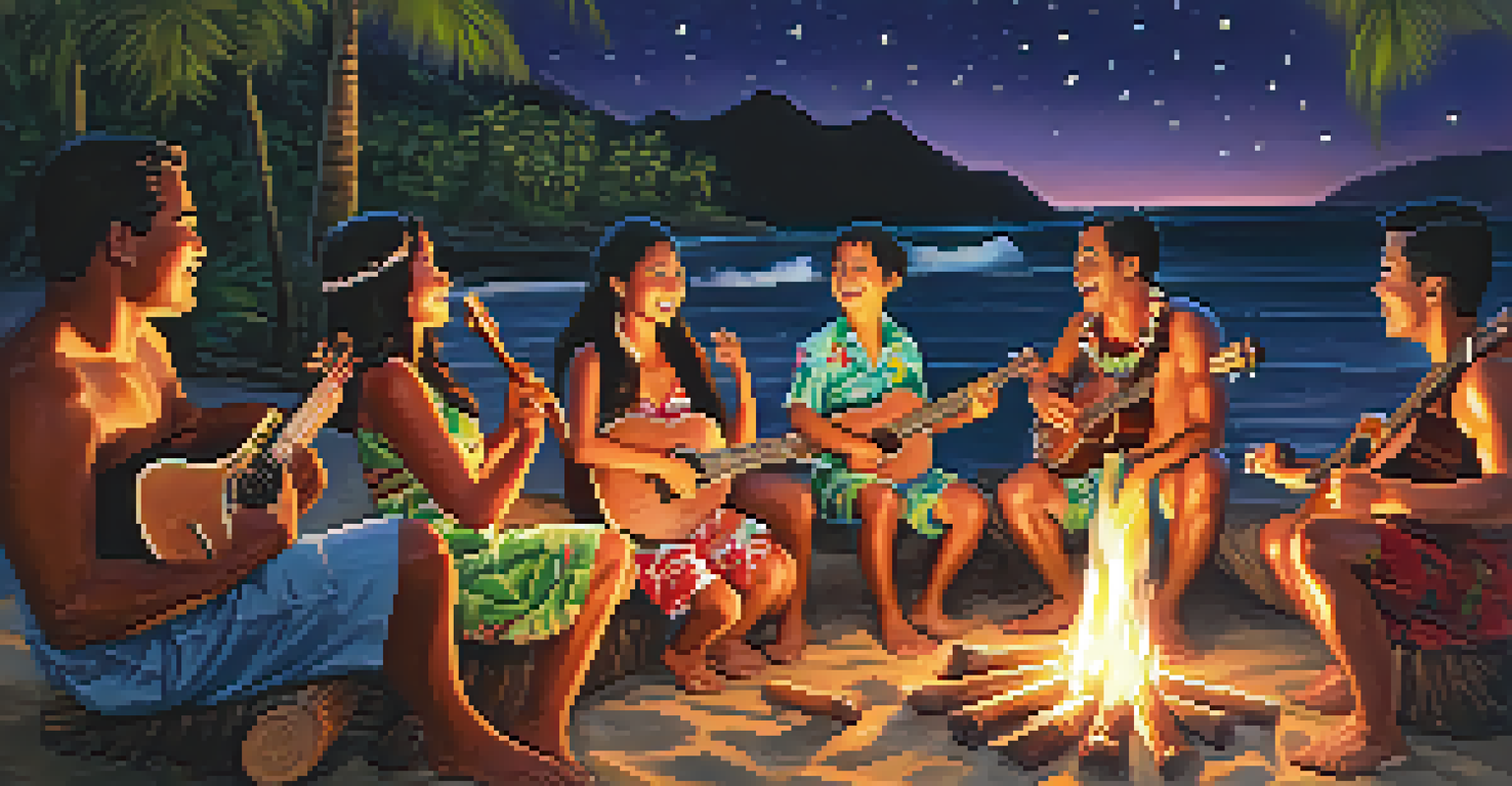The Evolution of the Ukulele: From Hawaii to Global Icon

The Origins of the Ukulele in Hawaii
The ukulele has its roots in the 19th century, emerging in Hawaii as a result of Portuguese immigrants bringing their stringed instruments. The small, guitar-like instrument quickly captured the hearts of the locals. Its cheerful sound and compact size made it ideal for Hawaiian music, which emphasizes rhythm and melody.
The ukulele is the perfect instrument to learn music on. It is small, affordable, and produces a cheerful sound that attracts everyone's attention.
As the instrument gained popularity, it began to evolve, with local craftsmen enhancing its design and sound. The name 'ukulele' itself translates to 'jumping flea,' a nod to the lively finger movements of players. This lively character contributed to its appeal, making it a staple at Hawaiian gatherings and celebrations.
The ukulele’s Hawaiian origins are celebrated in traditional songs, which often feature its bright, strumming chords. This connection to the islands is a significant part of its identity, and even today, the instrument evokes images of sun-soaked beaches and luaus.
Cultural Impact: The Ukulele in Hawaiian Society
In Hawaiian culture, the ukulele represents more than just a musical instrument; it embodies a sense of community and joy. It is commonly played at family gatherings, luaus, and local festivals, creating an atmosphere of togetherness. The sound of the ukulele often accompanies hula dancing, further solidifying its place in Hawaiian tradition.

As the instrument spread throughout the islands, it became a symbol of Hawaiian identity. Its popularity was bolstered by local musicians who infused traditional Hawaiian music with their unique styles. This blend allowed the ukulele to thrive, fostering a deep-rooted connection to the islands' rich cultural heritage.
Ukulele's Hawaiian Roots and Joy
The ukulele originated in Hawaii, symbolizing community and joy through its lively music at local gatherings.
Today, many Hawaiian artists continue to showcase the ukulele in their music, preserving its legacy while also exploring new genres. This ongoing love for the instrument helps keep Hawaiian culture alive and vibrant for future generations.
The Ukulele's Journey to the Mainland
The late 19th and early 20th centuries marked a significant turning point for the ukulele as it made its way to the mainland United States. The 1915 Panama-Pacific International Exposition in San Francisco introduced the instrument to a broader audience, sparking interest among mainland musicians. This event acted as a catalyst for the ukulele's rise in popularity across the country.
Music is the universal language of mankind. The ukulele brings people together, regardless of their background.
As the ukulele gained traction, it became a favorite among jazz musicians and entertainers. Its portability and ease of play made it an attractive option for performers looking to add a unique sound to their repertoire. The ukulele found a place in vaudeville shows and early film soundtracks, further embedding itself in American pop culture.
During this time, various ukulele manufacturers began producing instruments, leading to an increase in availability and affordability. This accessibility helped fuel the ukulele craze, with millions of Americans picking up the instrument and learning to play, creating a surge in its popularity.
The Ukulele in Popular Music: A New Era
The 20th century saw the ukulele being embraced by a diverse range of musical styles, from folk to rock and pop. Artists like George Formby and later, The Beatles, showcased the ukulele's versatility, introducing it to new audiences. Its playful sound became a beloved element in popular music, solidifying its status as a staple instrument.
In recent decades, the ukulele has enjoyed a resurgence in popularity, particularly among young musicians and educators. Its approachable nature makes it an excellent instrument for beginners, leading to an increase in ukulele clubs and classes across schools and communities. This trend has helped shape a new generation of ukulele enthusiasts.
Global Popularity and Cultural Impact
The ukulele's rise in popularity has transcended cultural boundaries, influencing music scenes worldwide and inspiring diverse styles.
Notably, contemporary artists like Jason Mraz and Ed Sheeran have incorporated the ukulele into their music, further legitimizing its place in the modern musical landscape. This crossover appeal has contributed to the ukulele's status as a global icon, transcending cultural boundaries.
Global Influence: The Ukulele Around the World
As the ukulele's popularity spread, it began to influence music scenes worldwide. Countries like Japan, the UK, and Australia have adopted the instrument, each infusing their unique styles into their playing. This globalization has led to a diverse array of ukulele music, showcasing its adaptability across cultures.
In places like Japan, the ukulele has been embraced not only as a musical instrument but also as a cultural phenomenon. Various festivals and competitions celebrate ukulele music, attracting enthusiasts from all over the world. This enthusiasm highlights the instrument's ability to connect people through music.
The accessibility of online learning resources has further propelled the ukulele's global reach. Aspiring musicians can learn from talented players and teachers worldwide, fostering a vibrant online community. This interconnectedness has ensured the ukulele's place as a beloved instrument across the globe.
The Ukulele's Role in Education and Community
The ukulele has found a special niche in education, with many schools incorporating it into their music programs. Its simplicity and light weight make it an ideal choice for young learners, allowing students to grasp musical concepts quickly. This educational aspect has encouraged countless children to develop a love for music.
Community initiatives and workshops often use the ukulele as a tool for engagement and creativity. Local organizations host ukulele clubs where players of all skill levels can come together to share their passion. These gatherings foster camaraderie and create a supportive environment for musicians to grow and learn from one another.
Education and Community Engagement
The ukulele serves as an accessible tool in education, fostering a love for music among young learners and building community connections.
Through its role in education and community, the ukulele has become a bridge for people of all backgrounds to connect through music. Whether in a classroom or a community center, the ukulele helps cultivate friendships and a sense of belonging among its players.
The Future of the Ukulele: Trends and Innovations
As we look to the future, the ukulele continues to evolve with new trends and innovations. Contemporary luthiers are experimenting with materials and designs, leading to unique sounds and aesthetics. This creativity ensures the ukulele remains relevant in the ever-changing landscape of music.
Additionally, the rise of social media platforms has created a space for ukulele players to showcase their talents. Musicians can share their progress, collaborate, and inspire others through platforms like Instagram and TikTok. This visibility enhances the ukulele's appeal and encourages even more people to pick it up.

With its rich history and vibrant community, the future of the ukulele looks bright. As it continues to inspire musicians around the world, the ukulele will likely remain a cherished instrument in both traditional and contemporary contexts.